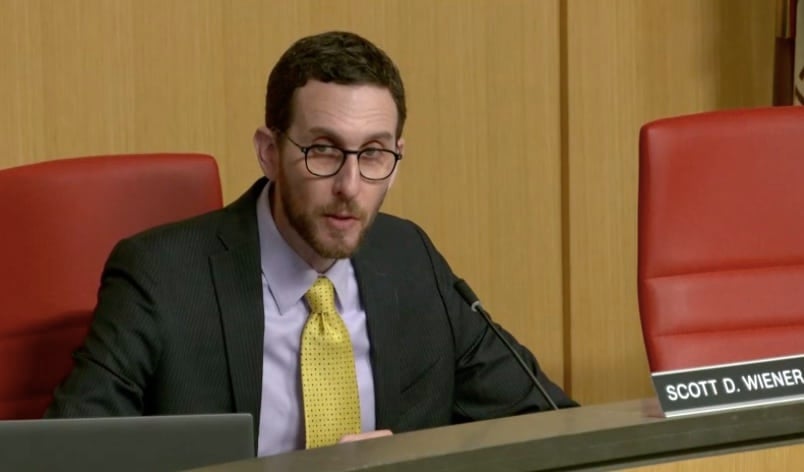SACRAMENTO, Calif. (CN) — Health care giant Kaiser Permanente — already facing a strike next week over claims of failing to address gaps in mental health care and staffing for patients — has drawn the scrutiny of California lawmakers regarding its compliance with a new law.
Kaiser Permanente, California’s largest health care provider with 9.4 million members, will likely face an open-ended strike by about 2,000 psychologists, therapists, counselors and social workers. It is led by the National Union of Healthcare Workers representing 16,000 health care workers in California and Hawaii.
Before the state Senate's select committee on mental health and addiction Thursday, therapists and patients described a system designed to obstruct people as doctors struggle to see patients in a timely manner with many needing help left waiting for months. This overloaded system has driven many clinicians to strike, with the union saying Kaiser has plenty of money to address these demands — netting $8.1 billion in profit last year with $54 billion in reserves.

California Department of Managed Health Care's director Mary Watanabe said Senate Bill 221 — which requires health insurers to provide return mental health therapy appointments within 10 business days unless a clinician determines a longer wait would not be detrimental to the patient — took effect more than one month ago. To ensure compliance, the department conducts audits of providers every three years as well as behavioral health investigations to assess commercial health care plans' delivery of mental health and substance abuse services.
The department began a non-routine review of Kaiser’s behavioral health system in May, after years of increasing complaints from patients and meetings with providers and members.
State Senator Richard Pan, a doctor and a Democrat from Sacramento, said he is concerned that the state needs to be more proactive to ensure compliance. In response, Watanabe said her department contacted Kaiser last week asking how the company will comply with timely service standards if the strike goes forward.
“We’re expecting Kaiser to fully comply with the timely access standards. Strike or no strike, as the regulator we’re going to hold them accountable,” Watanabe said.
Jasmin Hakes described to the panel her six-year struggle to get help for her daughter, until they were in crisis and required multiple hospitalizations. She said Kaiser repeatedly gave them pamphlets instead of care.
“We were told repeatedly there were no regular therapists available,” Hakes said.
Heidi Strunk, president and CEO of Mental Health America of California, said if there was adequate access to care crisis beds wouldn't be necessary. Her organization advocates for more timely care and voluntary respite beds far earlier, before the situation becomes a crisis.
“We have lost people’s lives as a result of making them jump through a list of unnecessary hoops,” she said.
Therapist Sarah Soroken described patients waiting months for appointments, sharing whistleblower images showing excessive wait times at clinics around Northern California.
Brandi Plumley, a rapid response therapist for Kaiser for 10 years, called it "extremely frustrating” to continue having to deny patients timely access to care. She said Kaiser knowingly understaffs clinics and more than 600 clinicians have left Kaiser in the last year — with 76% saying they felt they could not provide the care patients needed in time.
Dr. Emily Wood, committee chair for California State Association of Psychiatrists, said doctors are paying out of pocket for patients who need it, and some are out thousands of dollars. “The fundamental goal was to help them, not give them more problems than they already face," she said of the doctors' actions.
State Senator Scott Wiener — a Democrat from San Francisco who chaired the hearing — wrote SB 221. He said he is concerned that Kaiser will not inform members of their rights and will start "trashing the union" and blame any service delays on the strike.

“We would never tolerate what we heard today and what we hear on a regular basis in terms of denial of care if someone showed up with cancer or a broken arm,” he said.
A Kaiser spokesperson said the health plan has added hundreds of new mental health clinicians in the past five years, and meets regularly with the department to follow all requirements under the law.
''The implementation of SB 221 is challenging for all health plans and providers given the overall demand for mental health care and substance use disorder services — exacerbated by the pandemic — and the shortage of trained professionals both nationally and in California," the spokesperson said.
"We continue to hire clinicians in our specialty mental health departments at a higher rate than membership growth and this year launched a $500,000 recruiting initiative to source and hire clinicians to fill more than 1,000 open mental health clinician positions across Kaiser Permanente, more than 400 of which are in California. We’ve also invested $30 million to build a pipeline to educate and train new mental health professionals across the state," the spokesperson continued.
Wiener said the committee will work with patients and providers to make sure health plans are complying with the law. “Strikes are painful for absolutely everyone and I know the union and its members have made this decision as a very last resort," he said.
In an emailed statement, NUHW president Sal Rosselli said, “Kaiser has gotten away with delaying and denying access to mental health care for far too long. Therapists are ready to walk picket lines for as long as it takes to hold Kaiser accountable, and state leaders need to do their part by demanding that Kaiser follow the law.”
Subscribe to Closing Arguments
Sign up for new weekly newsletter Closing Arguments to get the latest about ongoing trials, major litigation and hot cases and rulings in courthouses around the U.S. and the world.








